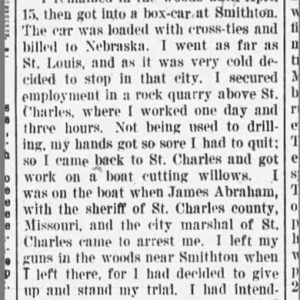calsfoundation@cals.org
Coleman “Fluke” Fleming (Execution of)
Coleman “Fluke” Fleming was a young African American man hanged at Dumas (Desha County) on August 5, 1898, after being convicted of rape—a charge he went to the gallows denying. He was one of two men executed in Arkansas on that day, the other being Charles Clyburn who was hanged at Prescott (Nevada County).
Nettie Wells, the fourteen-year-old daughter of Charles Wells, a “respected negro” who lived near Pine Bluff (Jefferson County), was walking to school on April 2, 1897, when she “was ravished by a negro man, who made his escape.” A posse failed to find him, but a few weeks later Coleman “Fluke” Fleming, an escaped convict aged nineteen, was arrested for “house-breaking” in Hot Springs (Garland County) and told the arresting officers that he was wanted for rape in Pine Bluff.
After being transported to Pine Bluff, Fleming was positively identified by the young victim as the man who had attacked her. The Arkansas Gazette stated that “he has served many years in the penitentiary….It’s said that this is his third arrest on the charge of rape, and it is expected to be the last, as the proof of guilt is conclusive.”
After winning a change of venue to Desha County, Fleming was tried in mid-February 1898. A newspaper reported that “the entire proceedings, including the selection of the jury, the examination of the witnesses, the speeches by the attorneys and finding of a verdict by the jury only occupied three hours.” The jury took just three minutes to find Fleming guilty of rape. He was sentenced to hang on March 31, 1898.
Fleming insisted from the start that he was innocent and that he would not hang. The Gazette wrote that “he spends his time in dancing, blaspheming and talking to the other occupants of the jail,” while stating that “no rope has yet been made to hang me with.” In late March, his jailors seized a bottle of iodine from him, with which he had planned to poison himself.
Three days before his scheduled execution, Hercules King Cannon White joined Fleming’s defense team, winning a stay of execution on March 31 so the case could be appealed to the Arkansas Supreme Court. “When told of the stay of execution Fleming gave vent to his good feelings and said that he would never hang,” the Gazette reported. On June 11, 1898, though, Supreme Court Justice Simon P. Hughes affirmed the conviction, and in early July, Governor Daniel Webster Jones set August 5 as the date for both Fleming and Clyburn to hang. Despite numerous pleas for him to commute Fleming’s punishment to life in prison, Jones refused, after which the doomed man said “he would kill himself before he would let the ‘whitefolks’ hang him.”
His mother begged him to let ministers counsel him, but the night before he was to die, he told a Pine Bluff Daily Graphic reporter, “I don’t want any preachers; he can’t do me any good. I will be better dead than alive anyway….One thing I do want to say and that is ‘I AM INNOCENT.’”
On the morning of August 5, 1898, Fleming was taken from the Jefferson County jail at 9:30 a.m. and had his photo taken before heading to the railroad depot, “where hundreds assembled to see him make his last departure from this city,” for the train ride to Dumas. As the train left, he called, “Good by boys and girls, good luck to you all.”
“Several thousand people” greeted the train when it arrived, and “Fleming carried a bouquet of flowers and wore a rose in his coat.” Apparently reconsidering his earlier religious stance, the condemned man was taken to the Dumas courthouse yard, “where he was baptized into the Christian faith.”
Fleming mounted the gallows at 1:25 p.m. and told the crowd, “I am not afraid to die….I am not dying for the crime of which I am accused….I will soon be gone and you all can pass this on after I am gone.” He then sang, “Going Across Jordan.” At 1:50, the Gazette stated, “the trap fell and Fluke Fleming shot into eternity”; the Daily Graphic reported that he “died in thirteen minutes without a kick.” His body was taken down at 2:03 p.m., and reporters from Little Rock (Pulaski County) and Pine Bluff gave his family money to cover the expense of returning his body to Pine Bluff for burial.
For additional information:
“Fleming Will Hang.” Pine Bluff Daily Graphic, July 29, 1898, p. 1.
“Fluke Fleming Is Gay.” Arkansas Gazette, March 11, 1898, p. 3.
“Had Tools to Kill.” Arkansas Gazette, March 20, 1898, p. 3.
“In Shadow of Death.” Arkansas Democrat, July 2, 1898, p. 5.
“Justice Quickly Meted Out.” Southern Standard, February 18, 1898, p. 1.
“Never Kicked.” Pine Bluff Daily Graphic, August 5, 1898, p. 1.
“An Old Offender.” Arkansas Gazette, April 20, 1897, p. 6.
“Shot Into Eternity.” Arkansas Gazette, August 6, 1898, p. 3.
“Stay of Execution.” Arkansas Gazette, April 1, 1898, p. 2.
“Supreme Court.” Arkansas Democrat, June 11, 1898, p. 5.
“To Be Executed.” Pine Bluff Daily Graphic, February 13, 1898, p. 1.
“Two Hanged.” Arkansas Democrat,” August 5, 1898, p. 4.
“Will Fleming Hang?” Arkansas Gazette, March 29, 1898, p. 2.
Mark K. Christ
Little Rock, Arkansas


 Charles Clyburn Execution Article
Charles Clyburn Execution Article 



Comments
No comments on this entry yet.